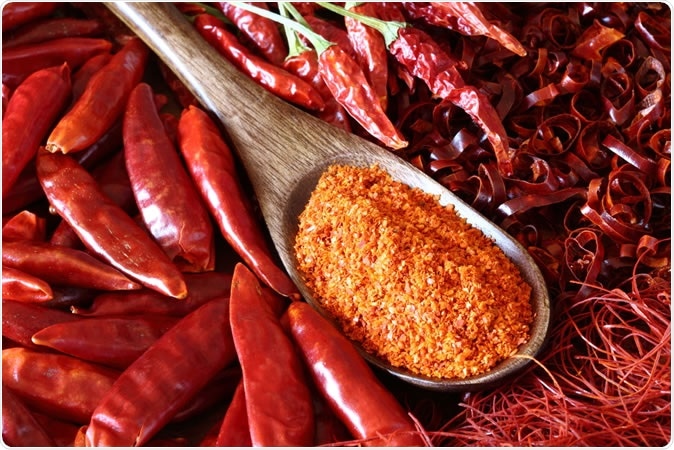A new study has revealed that a diet that includes chillies could help lower the risk of heart disease. The study was published in the latest issue of the Journal of the American College of Cardiology this week.

Red pepper, chili pepper. Image Credit: Gontabunta / Shutterstock
For this study the team of researchers included 22,811 Italians who were part of the Moli-sani Study cohort (2005 to 2010) and looked at their dietary habits as well as their medical health records. Some of them had a healthy balanced diet while others had a less healthy diet found the team of researchers. They estimated chilli pepper intake using the “EPIC (European Prospective Investigation Into Cancer) Food Frequency Questionnaire”. The classification of the participants were as follows – “none/rare consumption, up to 2 times/week, >2 to <4 times/week, and >4 times/week.”
The participants were followed up for an average of 8.2 years and during this time a total of 1,236 deaths were recorded. Regular chilli consumption was associated with lower all cause deaths, deaths due to cardiovascular disease and also causation of ischemic heart disease, cerebrovascular deaths (stroke). They noted that the Italians who ate chilli peppers at least four times per week had a 23 percent lower risk of deaths due to any cause and a 34 percent lower risk of dying due to cardiovascular disease. These individuals were healthier, stronger and free of high blood pressure.
There have been studies from China and United States previously that have revealed that hot chilli peppers and not Italian cooking can be the reason behind the protective effect on the heart and blood vessels.
There is, for example, a large Chinese study with 487,375 people from 10 different regions in China that showed that persons who were consuming spicy foods at least six or seven times per week were at a 14 percent lower risk of deaths compared to those who consumed spicy foods at least once a week. The study had however shown that those who ate spicy foods frequently also had other poor lifestyle behaviours such as smoking and excessive alcohol use. Persons who did not drink or smoke had a greater protective effect of spicy food on their hearts, the study had found. This study titled, 'Consumption of spicy foods and total and cause specific mortality: population based cohort study' was published back in 2015 in the British Medical Journal.
An American study titled, 'The Association of Hot Red Chili Pepper Consumption and Mortality: A Large Population-Based Cohort Study', involving 16,179 people in 2017 also showed that Americans consuming hot chilli peppers were at a 13 percent lower risk of death compared to individuals who did not consume these peppers. This study came from the National Health and Nutritional Examination Survey (NHANES) and was published in the PLOS ONE.
This new study set out to see if it was Italian cuisine that was providing the heart benefits or the consumption of the chilli peppers. Italian cuisine is more likely to include the Mediterranean diet which is known to be a heart healthy diet. This new study along with the Chinese and American studies shows that hot chilli peppers provide a protective effect on the heart irrespective of the cuisine.
The researchers explain that chillies contain a compound called capsaicin. Sweet bell peppers are known to have no capsaicin content and the hot peppers are known to have high capsaicin content. This study showed that those who consumed sweet bell peppers did not enjoy a heart protective effect. Marialaura Bonaccio, an epidemiologist at the Mediterranean Neurological Institute (Neuromed), lead author of the study said, “In general the association of sweet peppers with mortality were less strong than the ones of chilli peppers, suggesting a role for capsaicin.”
Bonaccio said, “An interesting fact is that protection from mortality risk was independent of the type of diet people followed. In other words, someone can follow the healthy Mediterranean diet, someone else can eat less healthily, but for all of them chilli pepper has a protective effect.”
The authors of the study wrote in conclusion, “In a large adult Mediterranean population, regular consumption of chilli pepper is associated with a lower risk of total and CVD death independent of CVD risk factors or adherence to a Mediterranean diet. Known biomarkers of CVD risk only marginally mediate the association of chilli pepper intake with mortality.”
The team said that although they were sure that it was capsaicin that was the protective factor, no direct association could be found. They noted that those who ate more chilli peppers were more obese than non consumers. The team wrote that as of now only a significant association between hot chilli pepper consumption and heart and blood vessel protective effect has been noted but the underlying reason needs to be explored further.
Journal reference:
Chili Pepper Consumption and Mortality in Italian Adults Marialaura Bonaccio, Augusto Di Castelnuovo, Simona Costanzo, Emilia Ruggiero, Amalia De Curtis, Mariarosaria Persichillo, Claudio Tabolacci, Francesco Facchiano, Chiara Cerletti, Maria Benedetta Donati, Giovanni de Gaetano, Licia Iacoviello, on behalf of the Moli-sani Study Investigators J Am Coll Cardiol. 2019 Dec, 74 (25) 3139-3149, http://www.onlinejacc.org/content/74/25/3139